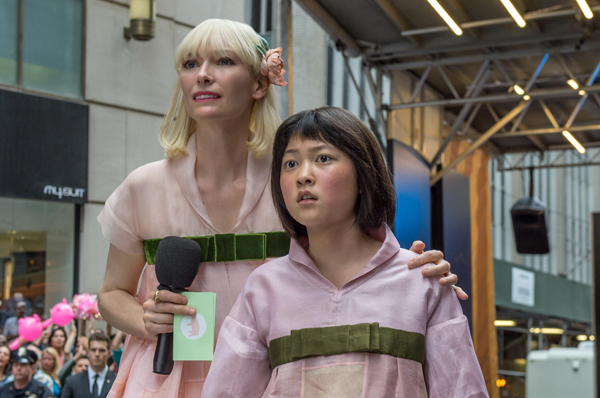In the early days of this year’s Cannes Film Festival, the presence of the streaming giant Netflix dominated the press coverage, as the company had two films in the official competition lineup: Bong Joon-ho’s Okja or Noah Baumbach’s The Meyerowitz Stories (New and Selected). Neither film, however, would be screened in French theaters afterwards, and as a result of a protest by French film industry, artistic director Thierry Frémaux announced before the festival began that all films competing in Cannes must have a French theatrical distributor in the future. (At one screening of Bushwick during the Directors’ Fortnight sidebar, there actually was nervous laughter and murmurs at the appearance of the Netflix logo before the opening credits.)
Yet both Okja and the smartly-written The Meyerowitz Stories, the latter of which offered a career-changing dramatic performance by Adam Sandler, deserved a place in the lineup. They were among the highlights of the 19 films that competed for the Palme d’Or. Among all the films screening here, Okja has a better-than-average chance of making a splash with a larger audience. It has as strong a pulpy, populist appeal as Snowpiercer, the last film by Joon-ho, and unlike several Cannes films that clung to one tone throughout (namely, Andrey Zvyagintsev’s bleak Loveless), Okja was the most dazzling in its use of color and snarky humor, a varied production design, and lucid action sequences. It was the most suitably dazzling competition selection for the state-of-the art screening at the Grand Théâtre Lumière, and the only one in which the visual flash on screen matched the chaotic excitement of the red carpet gauntlet.
Bong gives the audience a show, as his film is the cinematic answer to the eye-popping, Looney Tunes–exaggerated world of a graphic novel. Bong throws a lot of ideas and schtick onto the screen, and they stick. Though the tone goes all over the place, it’s a cohesive work—part action romp, part Island of Doctor Moreau, with a large dose of coming-of-age. The pace stays light on its feet, even as the narrative takes a grim (as in the Brothers Grimm) turn.
The story is straight out of a middle grade novel: the powerful agrochemical conglomerate Mirando Corporation has secretly engineered a new species of 26 piglets, supposedly in an effort to reduce the number of livestock and therefore lessening their carbon footprint while producing more food. It’s also an effort to rebrand the family-owned company’s genuinely toxic history—dad made nerve gas. (The movie was obviously made before the Trump administration withdrew the United States from the Paris Climate Agreement.) The 10-year secret project is the brainchild of chirpy CEO Lucy Mirando (Tilda Swinton), who spouts polished, camera-ready sound bites. To promote her company’s self-awareness, Mirando will stage manage a ticker-tape event in downtown Manhattan to celebrate the Best Super Pig Festival, revealing the winner, Okja.
Okja, a CGI creation, has been raised by a widower grandfather and his 14-year-old granddaughter, Mija (An Seo Hyun), in mountainous, middle-of-nowhere South Korea. Now 10 years old, the tail-wagging Okja has twice the body size of a lumbering, humongous hippo and the docile personality of a puppy, along with the intelligence—and loyalty—of a collie. Mija has raised Okja, and together they manage the family farm. (The latter belly flops into a pond to force fish out of the water, which provides food for the family.) Mija also knows her pet’s temperament: when she rubs Okja’s behind, it coaxes the animal to shoot out projectiles of poo, a trick that comes in handy later on.
The spokesperson for Mirando—a shrill, nerded-up Jake Gyllenhaal as zoologist Johnny Wilcox—and his TV crew arrive in the high elevation flushed and coated in sweat, yet ready to steal Okja away to the pig fest. Unbeknownst to Mija, the crew, backed up by reinforcements, hogtie the pet pig and jet her off to America (her granddad has known of the plan all along). Then the plus-sized porker and the teenager fight back. Their bond challenges the objectives of the TV crew, the Seoul police force, and the corporate machinations of Mirando.
Though some of the duo’s scrapes and escapes from the baddies are straight out of a Hollywood movie, Boon refrains from depending on the action sequences to move the story along. Instead, Mija’s efforts to bring Okja home drive the film. Her singular focus remains uncompromised. The same, however, can’t be said of the adults, even those who try to aid Okja and Mija, such as the Animal Liberation Front, headed by Jay (Paul Dano), who has the most calming voice amidst the mayhem. Boon builds suspense straightforwardly. In a plan to free Okja from captivity, the Jay assures Mija the plot will go as clockwork—but he adds that no matter what happens, the teen should never look back behind her. The audience knows why Jay is trying to protect Mkja, and you don’t have to be a betting man to guess if she turns around or not. It’s a matter of when.
As she proved in Hail, Caesar!, dual roles are Swinton’s forte, whether as the chirpy Lucy, who has the cheerleading spunk of a teenager (and braces, to boot) or her more controlled, frumpy archnemesis, sister Nancy. (Swinton is one of the film’s producers.) Only Gyllenhaal tries too hard at quirkiness, straining while the rest of the cast goes with the flow.
Netflix is actually an ideal home for this film, which is itself a type of hybrid. Okja would be a challenge to market for a theatrical release and could conceivably get lost in theaters after not finding an audience in its first week. Is it a kids’ film? Well, yes to a point, until the graphic killing of animals begins, as well as other acts of violence. But the F-bombs dropped by Swinton’s Lucy push the movie more toward adults. On Netflix, the film will be far more accessible to its various audiences without having to target a specific demographic. Like Okja, the movie’s a rare animal that should be able to find its way along.







Leave A Comment